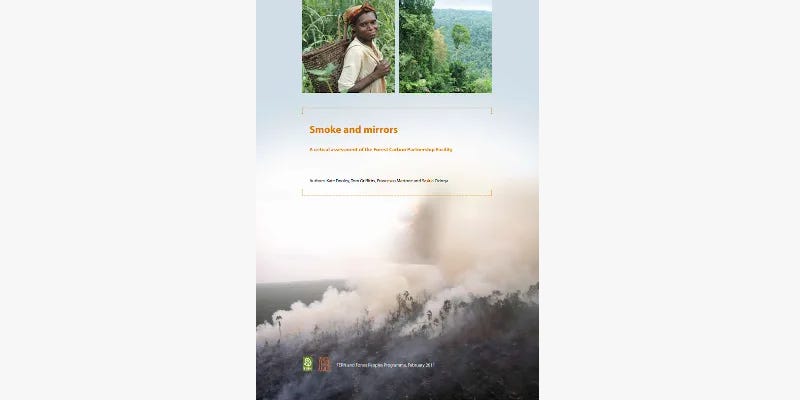Smoke and Mirrors: A critical assessment of the Forest Carbon Partnership Facility
A new report from FERN and the Forest Peoples Programme concludes that the safeguards put in place by the World Bank’s Forest Carbon Partnership (FCPF) are inadequate.
The report looks at eight Readiness Preparation Proposals (R-PPs) submitted to the FCPF and finds that FCPF safeguards are not clear and do not conform to the World Bank’s own safeguards.
This is FERN and FPP’s second report focusing on the FCPF. A 2008 report, “Cutting Corners” reviewed the REDD concept notes presented to the FCPF and concluded that the process had been rushed “with little or no consultation with indigenous peoples, local communities or civil society organisations, and failed to meet the Bank’s own standards.”
The new report, “Smoke and Mirrors: A critical assessment of the Forest Carbon Partnership Facility,” finds that,
FCPF is still failing to fulfil its social and environmental commitments, while national REDD Readiness Preparation Proposals (R-PPs) lack sufficient plans for policy and legal reforms that would uphold forest peoples’ rights, improve forest governance and reduce deforestation.
The report describes the way the World Bank and recipient governments appear to be colluding with each other to hide the problems with FCPF as a game of “smoke and mirrors”. The report reviews eight R-PPs, from Peru, Panama, Nepal, Indonesia, Ghana, the Republic of Congo and the DR Congo.
The executive summary of the report lists the following key findings:
It is unclear whether specific FCPF safeguard measures are mandatory requirements or are optional at different stages of the REDD process. Rather than strengthening and implementing the Bank’s safeguards, the FCPF has created a dense set of guidelines that appear to water down existing policies and obfuscate minimum standards.
R-PPs do not contain concrete proposals to address land conflicts and outstanding land claims, and overlook serious weaknesses in national legal frameworks, especially relating to respect for customary rights, FPIC and related land demarcation and titling procedures.
Most R-PPs rely on biased analyses of the causes of deforestation that blame indigenous peoples and local communities for forest loss and damage, without justification.
National consultations on draft R-PPs have been either non-existent or inadequate, and core observations and proposals of forest peoples are being disregarded or only given superficial treatment, in particular recommendations relating to land and territorial rights.
All the R-PPs reaffirm state ownership over forest lands and most focus on valuation and monitoring of forest carbon to the exclusion of livelihood, biodiversity and cultural values.
Though R-PPs acknowledge the need for governance reforms, most confine this to the establishment of new government institutions to oversee REDD and related forest and climate programmes.
In other words, things have not improved since 2008 and the “Cutting Corners” report.
Not only is the FCPF still ‘cutting corners’, it is now playing a game of ‘smoke and mirrors’ to distract attention from unresolved safeguard issues. At the same time the FCPF is moving ahead to create a global market in forest carbon credits, before governments have made such a decision and despite growing doubts about the risks to forests and peoples of such a market and the failures of carbon trading in general.




Comments following the original post on REDD-Monitor.org are archived here: https://archive.ph/4E7bJ#selection-2585.0-2585.9